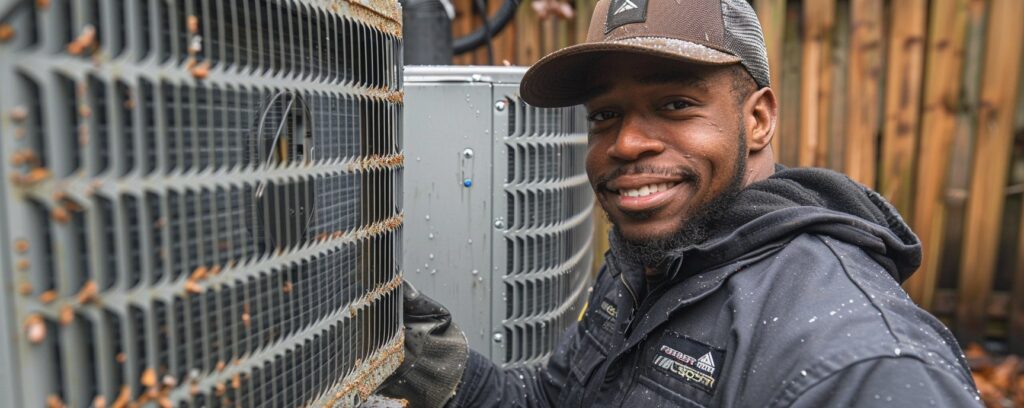The HVAC industry, short for Heating, Ventilation, and Air Conditioning, plays a crucial role in our modern lives, providing comfort and air quality in homes, offices, and industrial spaces. Within this dynamic field, HVAC Journeymen are skilled professionals who have reached a level of expertise and experience that makes them highly sought-after. In this article, we will explore the path to becoming an HVAC Journeyman and the numerous opportunities this profession offers.
Imagine being the person responsible for ensuring that homes stay warm in the winter and cool in the summer, or that commercial buildings maintain a comfortable climate year-round. HVAC Journeymen are the individuals who make it happen. They possess a unique set of skills that enable them to design, install, maintain, and repair HVAC systems, contributing to the comfort and well-being of countless individuals.
As we delve into the journey to become an HVAC Journeyman, we will cover the essential steps, educational requirements, and the significance of apprenticeships and certifications. We’ll also address the time it takes to achieve this esteemed status and why embarking on this career path can be a rewarding choice.
Steps to Become an HVAC Journeyman
Becoming an HVAC Journeyman involves a well-defined process that includes education, hands-on training, and obtaining the necessary certifications. Here, we’ll break down the key steps you need to follow to embark on this exciting career journey:
-
Educational Requirements: The first step on the path to becoming an HVAC Journeyman is to meet the educational prerequisites. Typically, you’ll need a high school diploma or its equivalent to get started. A solid foundation in math, physics, and basic mechanical skills can be advantageous.
-
Apprenticeship: Apprenticeships are the heart of HVAC training. These structured programs combine classroom instruction with on-the-job training under the guidance of experienced professionals. During your apprenticeship, you’ll gain practical experience working on HVAC systems, learning how to install, troubleshoot, and maintain various components.
-
Licensing and Certification: Once you’ve completed your apprenticeship and gained the necessary hands-on experience, the next step is to obtain the required licenses and certifications. Licensing requirements vary by state, but most states mandate that HVAC Journeymen pass a licensing exam to demonstrate their competence and knowledge. In addition to licensure, many HVAC professionals pursue certifications from organizations like the North American Technician Excellence (NATE) to further validate their expertise.
In the following sections, we will delve deeper into each of these steps, offering guidance and insights to help you navigate your journey to becoming an HVAC Journeyman. Whether you’re just starting your career or looking to make a switch, the HVAC industry offers a promising future for those willing to put in the effort and dedication required to excel in this field.
How Long Does It Take to Become an HVAC Journeyman?
The timeline to become an HVAC Journeyman can vary depending on several factors, including your chosen educational path, prior experience, and the specific requirements in your state. Here, we’ll explore the typical duration and variables that can impact the time it takes to achieve Journeyman status.
Average Duration: On average, it takes about 3 to 5 years to become an HVAC Journeyman. This time frame includes the duration of your apprenticeship, which is typically 3 to 4 years, as well as the additional time needed to prepare for and pass any required licensing exams.
Apprenticeship Length: The core of your HVAC training is your apprenticeship, which lasts anywhere from 3 to 4 years. During this period, you’ll work full-time under the mentorship of experienced HVAC professionals. You’ll gain invaluable hands-on experience and learn the ins and outs of HVAC systems.
Prior Experience: If you have prior experience in a related field, such as construction or electrical work, you may be able to reduce the duration of your apprenticeship. Some states offer credit for relevant work experience, allowing you to complete your apprenticeship in a shorter time.
State-Specific Requirements: It’s essential to be aware that licensing and certification requirements vary from state to state. Some states have stringent prerequisites, while others have more lenient regulations. Researching the specific requirements in your state is crucial to understanding the timeline you’ll need to follow.
Why Become an HVAC Journeyman?
Now that we’ve explored the timeline to become an HVAC Journeyman, let’s delve into the compelling reasons why pursuing this career path can be a wise and fulfilling choice.
Career Stability and Job Demand: The HVAC industry is known for its stability, as people will always need heating, cooling, and ventilation systems. This translates to a consistent demand for skilled HVAC professionals. As an HVAC Journeyman, you’ll find that your expertise is always in need, providing you with job security even in challenging economic times.
Opportunities for Specialization: HVAC is a diverse field that offers numerous avenues for specialization. Whether you’re interested in residential or commercial systems, refrigeration, green technologies, or indoor air quality, there’s a niche for you to explore and become an expert in.
Potential for Career Growth: HVAC Journeymen have the potential to advance their careers further by becoming HVAC contractors, supervisors, or project managers. With additional experience and education, you can climb the career ladder and increase your earning potential.
Personal Satisfaction: Many HVAC Journeymen find deep satisfaction in their work, knowing that they play a vital role in ensuring people’s comfort and safety. It’s a hands-on profession that allows you to see the tangible results of your efforts, making it personally rewarding.
As we continue this journey into the world of HVAC Journeymen, we’ll explore where they work, the potential earnings in this field, and the various educational paths available. Whether you’re drawn to the stability of the HVAC industry or the opportunity to make a meaningful impact, becoming an HVAC Journeyman offers a promising career with a bright future.
Certainly! Here are the content sections for “Where Do HVAC Journeymen Work?” and the bulleted list of benefits of becoming an HVAC Journeyman:
Where Do HVAC Journeymen Work?
HVAC Journeymen are in demand across various industries and settings, ensuring that they have a wide range of job opportunities. Here, we’ll explore the different places where HVAC Journeymen work and the diversity of environments they can find themselves in.
Types of Employers: HVAC Journeymen can be employed by various types of organizations, including HVAC companies, residential and commercial construction firms, property management companies, and government agencies. Each of these employers offers distinct job roles and challenges.
HVAC Companies: Many HVAC Journeymen work for HVAC service and installation companies. These companies provide services to residential, commercial, and industrial clients, offering a diverse array of projects and maintenance tasks.
Construction Firms: In the construction industry, HVAC Journeymen are involved in the installation and maintenance of HVAC systems in new buildings and renovation projects. This can be especially dynamic work, as it often involves collaborating with other construction professionals.
Property Management: Some HVAC Journeymen are employed by property management companies to ensure that HVAC systems in residential and commercial properties are operating efficiently. Maintenance and troubleshooting are key responsibilities in this setting.
Government Agencies: Local, state, and federal government agencies may hire HVAC Journeymen to maintain and repair HVAC systems in public buildings, schools, hospitals, and other facilities. Government positions often come with job security and competitive benefits.
Geographic Diversity: HVAC Journeymen are needed in both urban and rural areas, providing opportunities for employment across the country. The geographic diversity of job opportunities allows professionals to choose settings that align with their preferences.
Self-Employment and Entrepreneurship: Some experienced HVAC Journeymen choose to start their own HVAC businesses. Venturing into self-employment or entrepreneurship allows individuals to have more control over their careers and financial potential.
As you consider your journey to becoming an HVAC Journeyman, keep in mind that the type of employer you choose can significantly impact your day-to-day responsibilities and work environment. The HVAC industry’s versatility ensures that you can find a niche that suits your skills and interests.
Benefits of Becoming an HVAC Journeyman
Job Security: The consistent demand for HVAC services provides job stability, ensuring a steady stream of work opportunities.
Competitive Salary: HVAC Journeymen earn competitive salaries, often with the potential for overtime pay and bonuses.
Varied Work Environments: From residential homes to commercial buildings, HVAC Journeymen work in diverse settings, making every day unique.
High Demand for HVAC Professionals: The ongoing need for heating, cooling, and ventilation systems ensures a robust job market for HVAC Journeymen.
Opportunity for Continued Learning: The HVAC field is ever-evolving with new technologies and systems. Journeymen have the chance to continually update their skills.
Contributing to Energy Efficiency and Sustainability: HVAC Journeymen play a vital role in making buildings more energy-efficient, reducing environmental impact.
As we continue to explore the HVAC profession, we’ll dive into more details, including the salary expectations for HVAC Journeymen and the various degrees and certifications that can enhance your career prospects in this field. Whether you’re motivated by job stability, diverse work environments, or the opportunity to make a difference, becoming an HVAC Journeyman offers a fulfilling and rewarding career path.
Certainly! Here are the content sections for “HVAC Journeyman Salary” and “Average Salary,” including an overview of the highest HVAC Journeyman salary and highest-paying states:
HVAC Journeyman Salary
Understanding the potential earnings of an HVAC Journeyman is a crucial aspect of considering this career path. HVAC professionals are well-compensated for their expertise and essential role in maintaining indoor comfort. In this section, we’ll delve into the details of HVAC Journeyman salaries, from the average income to the highest earning potentials.
Average Salary: The average salary for HVAC Journeymen varies depending on factors such as location, experience, and specialization. As of the most recent data, the median annual salary for HVAC Journeymen in the United States is approximately $52,000 to $65,000. However, it’s important to note that this figure can be significantly higher in certain regions with a high demand for HVAC services.
Highest HVAC Journeyman Salary: HVAC Journeymen with extensive experience and expertise can earn well above the average. In some cases, Journeymen who have established their own successful HVAC businesses or have specialized in complex and high-value projects can command salaries exceeding $100,000 per year.
Highest Paying States: The income of HVAC Journeymen can vary significantly depending on the state in which they work. Some states offer higher salaries to HVAC professionals due to factors like climate demands, cost of living, and local demand for HVAC services. States with high salaries for HVAC Journeymen often include:
Alaska: With its extreme climate, Alaska consistently ranks among the highest-paying states for HVAC professionals. Journeymen in Alaska can earn well above the national average.
New Jersey: New Jersey offers competitive salaries to HVAC Journeymen, reflecting the high demand for climate control services in the state.
Hawaii: In Hawaii, where air conditioning is essential year-round, HVAC Journeymen can earn above-average salaries to meet the demand for cooling systems.
District of Columbia: The nation’s capital consistently ranks among the top-paying regions for HVAC professionals due to its need for well-maintained HVAC systems in government and commercial buildings.
Massachusetts: HVAC Journeymen in Massachusetts enjoy high salaries, driven by a strong job market and a focus on energy efficiency.
It’s essential to consider these regional variations in salary when planning your HVAC career. While salaries are generally competitive across the board, your income potential can be significantly influenced by where you choose to work and the level of demand for HVAC services in your area.
HVAC Journeyman Career and Job Growth
The HVAC industry continues to offer promising career prospects, with a positive job outlook for HVAC Journeymen. In this section, we’ll explore the potential for career growth and the factors contributing to job demand in this field.
Projected Job Growth: According to the Bureau of Labor Statistics, the HVAC industry is projected to experience steady 6% job growth in the next ten years. As buildings become more energy-efficient and environmental concerns rise, there’s a growing need for HVAC professionals to install, maintain, and upgrade systems to meet modern standards.
Opportunities for Specialization: HVAC Journeymen have the chance to specialize in various areas, such as residential HVAC, commercial HVAC, industrial systems, or green technologies. Specialization can lead to higher-paying positions and more job opportunities in your chosen niche.
Career Advancement: With experience and additional education or certifications, HVAC Journeymen can advance their careers. Roles like HVAC contractor, project manager, or supervisor offer leadership opportunities and increased earning potential.
Real-Life Success Stories: Throughout your career journey, you’ll likely encounter inspiring success stories of HVAC Journeymen who started from the ground up and built thriving careers in this field. These stories serve as a testament to the potential for growth and achievement within the HVAC industry.
As we continue to explore the world of HVAC Journeymen, we’ll take a closer look at the educational pathways available in this field and address frequently asked questions about becoming an HVAC Journeyman. Whether you’re just starting or looking to advance your HVAC career, the industry offers a bright future filled with opportunities for those with the dedication and skills to succeed.
Certainly! Here are the content sections for “HVAC Journeyman Degrees” and “HVAC Journeyman FAQ”:
HVAC Journeyman Training
In the HVAC field, educational pathways can vary, and the level of formal education you pursue can significantly impact your career opportunities and earning potential. Here, we’ll explore the different degrees available for HVAC professionals, from associate’s degrees to master’s degrees, and discuss how each can enhance your HVAC Journeyman journey.
Associate’s Degree in HVAC Technology: An associate’s degree in HVAC technology is a popular choice among aspiring HVAC professionals. This two-year program provides a comprehensive education in HVAC systems, including installation, maintenance, troubleshooting, and refrigeration. It can open doors to entry-level HVAC positions and is often pursued by those looking for a well-rounded foundation in the field.
Bachelor’s Degree in HVAC Engineering: For those seeking a deeper understanding of HVAC systems and a career in HVAC engineering, a bachelor’s degree is an excellent option. This four-year program covers advanced topics in HVAC design, energy efficiency, and system optimization. Graduates often find opportunities in design, project management, and consulting roles.
Master’s Degree in Energy Management (if applicable): Some HVAC professionals choose to pursue a master’s degree in energy management, which can lead to roles focused on sustainability and energy efficiency. This degree program delves into advanced concepts in energy conservation, renewable energy systems, and green building practices. It’s a valuable choice for those interested in addressing environmental concerns in HVAC work.
The choice of degree depends on your career goals and desired level of specialization. An associate’s degree provides a solid foundation for entry-level positions, while a bachelor’s degree or master’s degree can open doors to higher-paying and more specialized roles within the HVAC industry.
HVAC Journeyman FAQ
As you consider a career as an HVAC Journeyman, you may have several questions about the profession, educational requirements, job prospects, and more. In this section, we’ll address some frequently asked questions to provide clarity and guidance.
What Degree Do I Need to Become an HVAC Journeyman?
To become an HVAC Journeyman, a formal degree is not always required. However, completing a relevant educational program, such as an associate’s degree in HVAC technology, can be highly beneficial and may provide a competitive edge in the job market. The primary requirements are completing an apprenticeship and obtaining the necessary licenses and certifications.
What Does an HVAC Journeyman Do?
HVAC Journeymen are skilled professionals responsible for installing, maintaining, repairing, and troubleshooting heating, ventilation, and air conditioning systems. Their duties can include working on HVAC equipment, ensuring systems are energy-efficient, and providing essential climate control for various settings, including homes, businesses, and industrial facilities.
How Long Does It Take to Become an HVAC Journeyman?
The timeline to become an HVAC Journeyman typically ranges from 3 to 5 years. This includes the duration of your apprenticeship, which is typically 3 to 4 years, and the time needed to prepare for and pass any required licensing exams.
How Much Do HVAC Journeymen Make?
HVAC Journeymen earn varying salaries depending on factors like location, experience, and specialization. On average, they can earn between $52,000 and $65,000 per year in the United States. However, experienced Journeymen in high-demand regions can earn significantly more.
What Skills Do I Need to Be an HVAC Journeyman?
Successful HVAC Journeymen possess a range of skills, including mechanical aptitude, problem-solving abilities, strong communication, and attention to detail. They should be skilled in reading blueprints, understanding electrical systems, and staying updated on industry trends and technologies.
Are There Internship Opportunities for HVAC Journeyman?
A: While internships are more common for individuals pursuing initial HVAC training, they may still be available for experienced HVAC professionals looking to gain additional skills or explore new specialties. Internships can offer valuable hands-on experience and networking opportunities.
As you embark on your journey to become an HVAC Journeyman, these FAQs should help clarify some of the key aspects of this career path. Keep in mind that HVAC is a dynamic field with opportunities for growth and specialization, making it a promising choice for those interested in skilled trades and climate control technology.
Conclusion
Becoming an HVAC Journeyman is not just a career choice; it’s a journey towards expertise, stability, and making a tangible impact on people’s lives. In this article, we’ve explored the multifaceted world of HVAC professionals, from the essential steps to achieve Journeyman status to the rewarding reasons why so many choose this path.
HVAC Journeymen are the unsung heroes behind the comfort we enjoy in our homes, offices, and industrial spaces. Their expertise in heating, ventilation, and air conditioning systems ensures that we stay warm in the winter, cool in the summer, and breathe clean air year-round. They are the individuals who troubleshoot problems, design efficient systems, and contribute to energy sustainability.
The path to becoming an HVAC Journeyman involves education, apprenticeships, and the acquisition of licenses and certifications. While the journey may take several years, the job security and competitive salaries make it a worthwhile pursuit. HVAC Journeymen work in a variety of settings, from HVAC companies and construction firms to government agencies and beyond, offering opportunities for specialization and growth.
We’ve also delved into the financial aspects of this profession, exploring average salaries, the potential for earning well above the national average, and the highest-paying states in the industry. With dedication and the right opportunities, HVAC Journeymen can build successful, lucrative careers.
In addition to financial rewards, HVAC Journeymen find personal satisfaction in their work. They play an essential role in ensuring that people lead comfortable lives, and they contribute to the ever-growing demand for energy-efficient and environmentally friendly HVAC systems.
Finally, we’ve discussed the educational pathways available for those pursuing a career in HVAC, from associate’s degrees to master’s degrees, and we’ve answered common questions to provide guidance for those considering this career path.
In the ever-evolving world of HVAC, one thing remains constant: the need for skilled professionals who are passionate about their work. Whether you’re just starting your journey or are already on the path to becoming an HVAC Journeyman, remember that your skills are in demand, and your contributions are invaluable. With dedication, you can look forward to a rewarding career in the HVAC industry.




